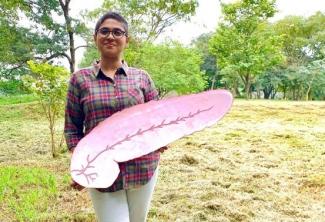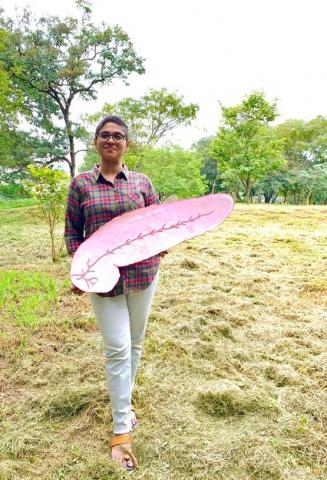
Shruthi Meera Shankar, 36 from Bangalore has been tackling Pancreatitis for the last seven years, a condition that has changed the course of her life. She discusses here how she has learnt to live with an almost incurable condition which increases her risk of Pancreatic Cancer.
Please tell us a bit about the health condition you were diagnosed with and when you were diagnosed?
Since 2013 I’ve been living with and managing Pancreatitis, although it was first diagnosed in 2014. Pancreatitis is an inflammatory disease of the pancreas and it is known to be progressively degenerative. First, my pancreatitis was recurrent, acute and then, it became chronic.
How does pancreatitis affect the normal functioning of the pancreas and our body?
The pancreas is responsible for insulin production, which is key for blood glucose metabolism in the body. It also produces digestive enzymes, which help in the breakdown and absorption of the food we consume, therefore a key factor for maintaining our nutritional health and wellbeing.
The illness and its manifestation affect the normal functioning of the pancreas because the inflammation and subsequent damage suffered by the organ can affect its ability to produce both the hormones and enzymes necessary to maintain our digestive and metabolic health.
What were the early symptoms you experienced?
I experienced my first symptoms when I was 27. Except for severe and radiating pain in my upper and general abdomen region and occasional loss of appetite, I did not exhibit any other clinical symptoms. My only observation at the time was that antacids had no effect and pain killers would only work for a few hours and they could never really address the pain completely.
What causes Pancreatitis and does it affect everyone in the same manner?
There are several causes a person can develop pancreatitis and the treatment provided depends on the cause, to a certain extent. Pancreatic inflammation can occur due to-presence of Gall stones, Alcohol abuse, Hereditary and/or genetic risk, Autoimmune causes, side effects of certain medications etc.
In my case, it happens to be ‘Idiopathic'-which means that the cause is unknown as of date. It is a major life-threatening disease with no cure (depending on the cause and how it manifests in a person’s body) and the treatment is largely based on the symptoms experienced by the individual.
Pancreatitis is a spectrum disease. This means that not everyone who develops pancreatitis will have the same kind of symptoms and not everyone will experience disease progression and loss of organ function in the same manner or timeline.
Is there any history of Pancreatitis or a similar condition in your family?
There is no known history of pancreatitis on my paternal or maternal side of the family so, right from diagnosis to treatment, we’ve had to learn everything from scratch with the help of qualified doctors and credible scientific resources.
What is your present condition?
After about 8 years of managing the recurring symptoms and progression of the disease, I now experience occasional inflammatory episodes/flare-ups of the pancreas. I've had to deal with multiple pseudocysts with fluid collection on the pancreas which leads to infection and hospitalisations. Over a period of time, the organ has calcified and atrophied to a large extent. I’m dependent on Insulin and oral medication to manage diabetes and, I need to take oral digestive enzymes to digest any food and beverage I eat daily.
Please describe your experience of managing Pancreatitis.
What I experience whenever I have an ‘attack’ because of pancreatitis includes-unbearable and debilitating pain in the abdomen area and the back, constant nausea even on an empty stomach, zero appetite and high infection levels within the body. It has been an uphill task to understand, accept and deal with different aspects of the disease and its unpredictable nature.
I’ve had over a dozen attacks like this in the last 8 years. Some were months apart, some of which were weeks apart and some episodes and constant pain have stayed on for more than 6 months, at a time. I’ve researched, studied, understood and experienced the benefits and limitations of Allopathic, Ayurvedic and other alternative forms of medicine applicable to this disease.
I’ve been pricked and prodded for diagnostic and follow up tests so many times that I have lost count of the bruises and band-aids I’ve had over the years. Multiple endoscopies, endoscopic ultrasounds, ERCP (Endoscopic retrograde cholangiopancreatography) procedures have added to the list of tests and treatments. I’ve experimented with different diets and lifestyle habits to complement medical therapies and continue to do so even today to ensure I try and maintain my health in the best possible way. Seeking competent medical advice, taking timely treatment and being mindful of what my body communicates is paramount to managing an all-consuming illness such as this.
What medications are you on?
My regular day to day medicines include two types of insulin injections, 2 anti-diabetic tablets per day, an anti-acidity tablet to help with the proper functioning of digestive enzyme capsules and digestive enzyme tablets with any food and beverage intake.
Apart from these, during an ‘attack’, I’m prescribed antibiotics, anti-nausea medication and pain management drugs. I also take supplements of antioxidants and vitamin D and B12 based on periodic review of blood tests to assess any deficiency.
Were there any side effects of the medicines?
Every medicine comes with its own set of side effects and I always ensure that I consult the doctors on the appropriate usage and dosage of each and every medicine. One of the most common side effects I experience includes fungal infections because of antibiotic usage and constipation because of digestive issues even on a good fibre diet. Tapering off of pain medicines can also have side effects of withdrawal sometimes.
Because of multiple rounds of antibiotics and lowered immunity, I've also contracted and recovered from intestinal Colitis and herpes infection near my eye.
How has the ongoing Pandemic affected the treatment of your condition?
Timely access to healthcare facilities and doctors and any investigative procedures have taken a hit because of the pandemic. Overburdened health care system causes more delays than normal and the fact that stepping out of the home during lockdown itself can sometimes be a challenge. This is in addition to the obvious risk involved in possibly contracting the virus if I choose to step out and interact with the outside world.

What is your advice to patients who face similar challenges?
- Pay attention to signs your body gives you when it is struggling. Take a pause, give it the rest and recuperation it needs and look after this beautiful machinery you get to live in.
- Educate yourself on what is good for your body and what isn’t. Cut them out of your life if it isn’t serving you positively.
- Seek competent medical help when you need to and follow through on advice that helps you recover.
- Invest in good medical insurance. I know this would mean different things in different countries but the intention is to ensure that your medical care doesn’t suffer based on your financial ability. Diagnostic tests, hospital visits, medicines and hospitalisations can cut very deep into our pockets. Ensure that you are covered in the best possible way for all of this. It is the best investment you can make. Also, if you’ve already been diagnosed, ensure that the insurance covers pre-existing conditions.
- Carry any daily and emergency medicines in a pouch whenever you travel. Keep them with you at all times. A few extra grams of luggage can save the day if and when you need them.
- Keep a medical file/journal with all your test reports and discharge summaries. Keep them organised by month/year. When you visit doctors/hospitals, this can be a great aid especially if you are distressed.
- Meditation can be an amazing tool in helping us recover and heal. Take advantage of it.
What kind of specialists do you consult and how often?
I usually consult medical and surgical Gastroenterologists for pancreatitis, endocrinologists for my insulin dependence along with dermatologists to address any skin flare-ups including boils, acne, hair loss etc. Doctor visits can range from a frequency of once every 2 months to once every 6 months outside of any emergency hospitalisations.
What resources are available to you in your city to help you manage the condition?
Both Bengaluru and Dubai are cities I spend time in and most of the times, I have access to good healthcare practitioners and facilities. I have had to travel to AIG hospital in Hyderabad and a hospital in Abu Dhabi for specialized treatment and doctor consultations, depending on the need of the hour.
Has it been difficult emotionally to cope with your condition?
It undoubtedly has an emotional toll and seeking therapy from a qualified therapist to help better understand my mental and emotional needs and capacities and to cater to it effectively have most definitely helped me cope better.
How has your family supported you?
Undoubtedly, my family has been a source of strength. Without my mother and her dedication, I would not be alive today. Having a support system is key for survival. Having open conversations about my needs, about the nature of the disease and being mindful of the impact it can have on us and our loved ones are essential in effectively managing this condition.
If I didn’t let my family or friends in, the isolation could have been catastrophic. Nobody knew about the condition and asking them to google only makes things worse. They understand the organ and the disease after our numerous conversations and discussions and the conversations keep evolving.
What was the hardest part of the illness and the treatment?
Pancreatitis took away my ability to have a full-fledged professional career and a life with some sort of predictability. It took away every semblance of control a normal human being has in their life choices, including something as simple as planning a vacation without being afraid as to what might go wrong. A little 6-inch organ that I did not know very much about, took centre stage and demanded every bit of attention and energy I could provide. This continues to be a challenge even today because the health and ill-health journey have its own life cycle.
What kept you going? How has this changed your life perspectives and ambitions?
All of my life goals took a serious hit owing to the unpredictable nature of the disease. I’ve had to reassess my professional strengths, skills and build capacity to work in a sphere that doesn’t require a 9 to 5 office set-up. I pursue activities that calm me and bring positivity into my life and I do my best to be prepared and organised in all my endeavours.
Finding my life’s purpose has been less confusing owing to this life experience so, I and committed to making the best out of a bad situation. Although having pancreatitis increases my risk of developing pancreatic cancer, with the help of my support system and some courage, I’m committed to looking after my body, mind and soul in the best way possible.






